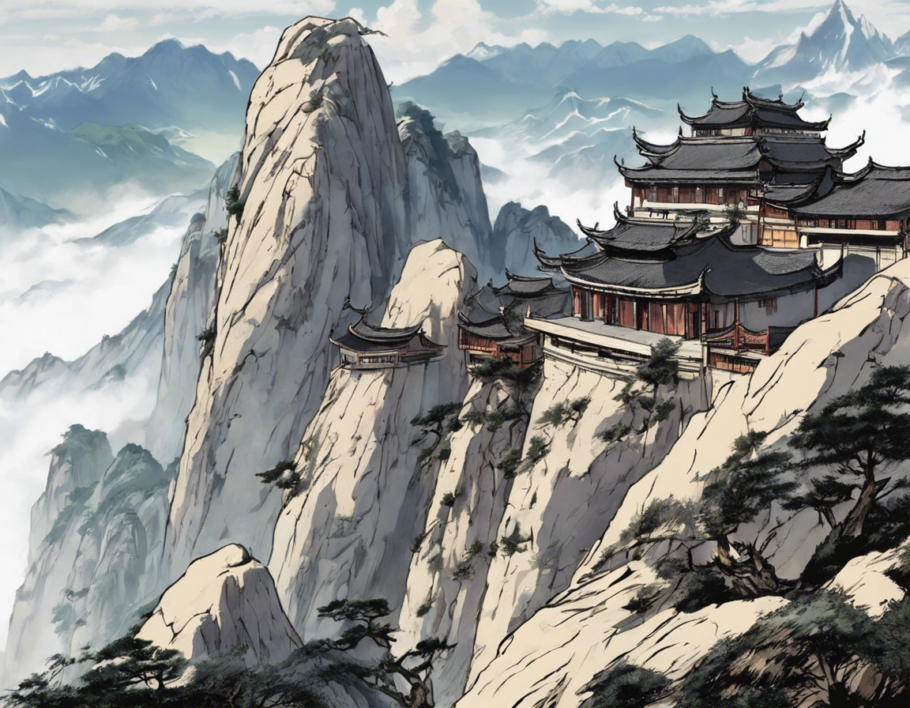The Mount Hua Sect holds a significant place in the realm of martial arts history and Chinese culture. This ancient sect, situated at the majestic Mount Hua in Shaanxi province, has been a symbol of martial prowess, spiritual enlightenment, and cultural heritage for centuries. In this comprehensive guide, we will delve deep into the history, philosophy, training methods, and modern relevance of the Mount Hua Sect, inviting you on a fascinating journey back in time.
History of the Mount Hua Sect
The Mount Hua Sect traces its origins back to the Han Dynasty (206 BCE – 220 CE), a time when martial arts were not only about combat skills but also about cultivating one’s mind and spirit. The sect flourished during the Tang Dynasty (618-907 CE), under the patronage of Emperor Xuanzong, who recognized its contributions to martial arts and spiritual development. The sect’s influence continued through the centuries, with renowned masters and practitioners passing down their knowledge and wisdom to future generations.
Philosophy of the Mount Hua Sect
Central to the Mount Hua Sect’s philosophy is the integration of martial arts, meditation, and spiritual cultivation. The sect emphasizes the unity of body, mind, and spirit, teaching that true mastery comes from inner peace and harmony. Practitioners are encouraged to embrace humility, discipline, and respect for all living beings, reflecting the sect’s deep Daoist and Buddhist roots.
Training Methods of the Mount Hua Sect
The training methods of the Mount Hua Sect are comprehensive and holistic, encompassing physical conditioning, combat techniques, meditation, and internal energy cultivation. Qigong, Tai Chi, Kung Fu, and swordsmanship are some of the core practices taught within the sect. These disciplines are not just about self-defense but serve as pathways to self-discovery, enlightenment, and personal transformation.
Core Elements of Training:
- Qigong: The cultivation of internal energy (Qi) through breathing exercises and movement.
- Tai Chi: A slow, graceful form of martial arts that promotes relaxation, balance, and health.
- Kung Fu: Dynamic and powerful techniques that enhance strength, flexibility, and agility.
- Swordsmanship: The art of wielding a sword with precision, focus, and grace.
Modern Relevance of the Mount Hua Sect
In today’s fast-paced world, the Mount Hua Sect continues to inspire martial artists, spiritual seekers, and cultural enthusiasts. The timeless wisdom and practices of the sect offer valuable lessons in mindfulness, balance, and self-improvement. Many martial arts schools around the world incorporate elements of the Mount Hua Sect’s teachings into their curriculum, keeping the tradition alive and relevant in the modern era.
Frequently Asked Questions (FAQs)
1. What is the significance of Mount Hua in Chinese culture?
Mount Hua is one of the Five Great Mountains in China, revered for its spiritual significance and natural beauty. It has been a site of pilgrimage, meditation, and martial arts training for centuries.
2. Is the Mount Hua Sect open to new students?
While the traditional Mount Hua Sect may have limited openings, many martial arts schools and instructors offer training in Mount Hua Sect practices and techniques.
3. What are the benefits of practicing Mount Hua Sect martial arts?
Practicing Mount Hua Sect martial arts can improve physical fitness, mental focus, emotional well-being, and spiritual growth. It teaches valuable life skills such as discipline, perseverance, and respect.
4. Are there any Mount Hua Sect martial arts competitions?
While there may not be specific Mount Hua Sect competitions, practitioners can participate in various martial arts tournaments and demonstrations to showcase their skills.
5. How can one incorporate Mount Hua Sect principles into daily life?
By embracing the values of humility, discipline, respect, and harmony, individuals can embody the essence of Mount Hua Sect philosophy in their daily interactions, decision-making, and personal growth.
6. What sets Mount Hua Sect martial arts apart from other martial arts styles?
The Mount Hua Sect’s emphasis on spiritual cultivation, internal energy cultivation, and holistic development sets it apart from many other martial arts styles that focus primarily on combat techniques.
7. Is it necessary to travel to Mount Hua to study the sect’s martial arts?
While studying at Mount Hua can offer a unique and immersive experience, many practitioners around the world have learned and practiced Mount Hua Sect martial arts through schools, workshops, and online resources.
8. Are there any famous historical figures associated with the Mount Hua Sect?
Several legendary martial artists, scholars, and philosophers have been associated with the Mount Hua Sect, including Zhang Sanfeng, Bodhidharma, and Wang Chongyang.
9. How can beginners start practicing Mount Hua Sect martial arts?
Beginners can start by finding a qualified instructor or school that teaches Mount Hua Sect practices, beginning with foundational techniques, forms, and principles before progressing to advanced levels of training.
10. What role does meditation play in Mount Hua Sect martial arts?
Meditation is an integral part of Mount Hua Sect training, helping practitioners develop mindfulness, concentration, and inner peace. It allows for the cultivation of Qi, self-awareness, and spiritual enlightenment.
In conclusion, the Mount Hua Sect stands as a timeless bastion of martial arts excellence, spiritual wisdom, and cultural heritage. By exploring its history, philosophy, training methods, and modern relevance, we gain a deeper appreciation for the profound teachings and practices that have shaped generations of martial artists and spiritual seekers. As we journey back in time through the Mount Hua Sect, we rediscover not only a rich tradition but also a path to self-discovery, personal growth, and holistic well-being.

